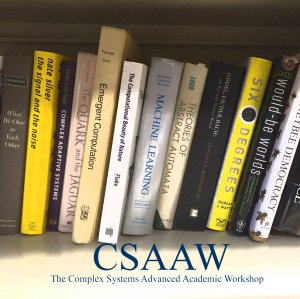Presented By: Complex Systems Advanced Academic Workshop (CSAAW)
CSAAW Seminar | Variance as a predictor of health outcomes
Irena Chen, PhD Candidate in Biostatistics, School of Public Health

Title:
Variance as a predictor of health outcomes
Secondary Title:
Using subject-level trajectories and residual variability to predict a cross-sectional outcome of interest
VIRTUAL SEMINAR - ZOOM MEETING LINK
https://umich.zoom.us/j/96316969456
Passcode: 984743
Abstract:
Longitudinal biomarker data and cross-sectional outcomes are routinely collected by design in numerous modern epidemiology studies. One scientific goal is to identify prognostic predictors that may inform tailored and early intervention decisions that may improve health outcomes. For example, estradiol (E2) and follicle-stimulating hormone (FSH) are two key hormones that may predict changes in womens’ health as they transition through menopause. Existing methods have mainly focused on constructing predictors by modeling mean hormone trajectories. However, the singular focus on the mean structure limits scientists’ ability to inquire about the role of subject-level biomarker variability in predicting the outcome of interest. Modeling variability as a predictor of health outcomes may also provide critical information about disease risk and health outcomes, and is an understudied area of statistics. In this presentation, I will describe a joint modeling framework that estimates subject-level means and variances of multiple longitudinal predictors in order to predict a cross-sectional health outcome, enabling systematic investigation of the role of multi-marker variability in health outcomes. I will also present a simulation study of the model and show that it has excellent recovery of true model parameters and that it provides less biased and more efficient estimates, relative to alternative approaches that either ignore subject-level differences in the variances, or perform two-stage estimation where estimated biomarker variances are treated as observed. Finally, I will present an application of this model to women's health data.
Variance as a predictor of health outcomes
Secondary Title:
Using subject-level trajectories and residual variability to predict a cross-sectional outcome of interest
VIRTUAL SEMINAR - ZOOM MEETING LINK
https://umich.zoom.us/j/96316969456
Passcode: 984743
Abstract:
Longitudinal biomarker data and cross-sectional outcomes are routinely collected by design in numerous modern epidemiology studies. One scientific goal is to identify prognostic predictors that may inform tailored and early intervention decisions that may improve health outcomes. For example, estradiol (E2) and follicle-stimulating hormone (FSH) are two key hormones that may predict changes in womens’ health as they transition through menopause. Existing methods have mainly focused on constructing predictors by modeling mean hormone trajectories. However, the singular focus on the mean structure limits scientists’ ability to inquire about the role of subject-level biomarker variability in predicting the outcome of interest. Modeling variability as a predictor of health outcomes may also provide critical information about disease risk and health outcomes, and is an understudied area of statistics. In this presentation, I will describe a joint modeling framework that estimates subject-level means and variances of multiple longitudinal predictors in order to predict a cross-sectional health outcome, enabling systematic investigation of the role of multi-marker variability in health outcomes. I will also present a simulation study of the model and show that it has excellent recovery of true model parameters and that it provides less biased and more efficient estimates, relative to alternative approaches that either ignore subject-level differences in the variances, or perform two-stage estimation where estimated biomarker variances are treated as observed. Finally, I will present an application of this model to women's health data.